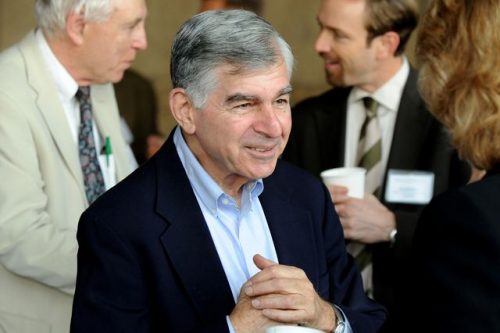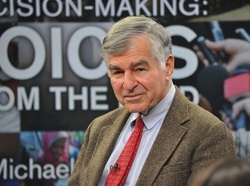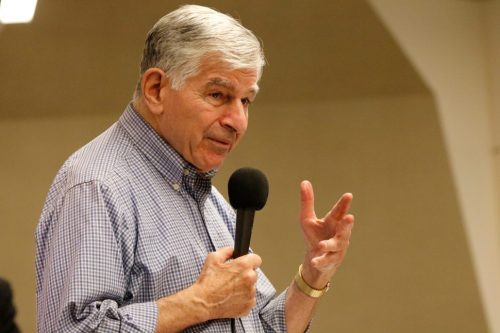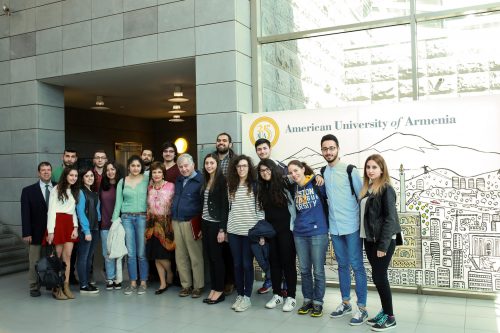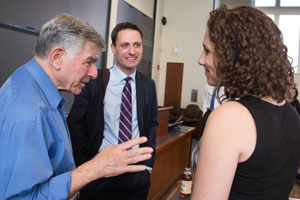
Governor Dukakis with Clinical Professor Robert Bordone ’97 (center), the course’s lead instructor and director of the Harvard Negotiation and Mediation Clinical Program
According to former Massachusetts Governor Michael Dukakis ’60, tackling most public policy challenges begins with the same steps.
“Make a list, create a working group,” Dukakis said. “Bring these folks together. See if you can at least begin by getting agreement on what the problem is. If you do that, you’re halfway to a solution.”
Dukakis, who was the Democratic nominee for president in 1988 and is now a professor of political science at Northeastern University, visited a session of Harvard Law School’s Negotiation Workshop in late April to lead discussion of a case study and answer student questions. Along the way, he shared anecdotes from his time as the longest-serving governor of Massachusetts and ideas about negotiation gleaned from a long career in public life.
The case under discussion came directly from real life: In 1970 a developer in Boston proposed an urban renewal project for the Park Plaza area south of Boston Common. It was a time, recalled Dukakis, when Boston was “angry” and “falling apart.” The city contemplated using its eminent domain power to obtain the land, but numerous neighborhood organizations opposed the demolition of the historical buildings in the area.
What’s a good negotiator to do in a situation like this? Make a list, Dukakis said. This list, he said, should include all of the individuals with an interest in the problem—business community members, representatives from all levels of government, media, private citizens and others.
The key players must then come together, he said—all of them, even the ones who cannot stand each other, “eyeballing each other around the table”—and work to build consensus.
But that’s just the beginning of the process. In the end, Dukakis explained over the course of the class, the Park Plaza proposal collapsed, the result of a failure by the key players to work together properly.
In successful working groups, Dukakis said, trust develops naturally when the parties listen to one another, care about others’ opinions and genuinely believe they are being respected. And at the conclusion of a successful working group, everyone involved should get an equal share of the credit for the result. As a result of such a process, those involved feel a sense of ownership over the project and will be willing to participate in the political legwork that comes next.
Over the course of his governorship, Dukakis said, he initiated and participated in such working groups, which both built trust within the government and tackled substantive policy issues.
During his second governorship (Dukakis first served from 1975 to 1979 and again from 1983 to 1991), he said, the law enforcement community in Massachusetts was internally fractured, with acrimonious relations among the various offices. On the advice of John Kerry, then lieutenant governor of Massachusetts, Dukakis convened a Governor’s Anti-Crime Council, bringing together key individuals in the Massachusetts criminal justice system along with non-law enforcement personnel. With Dukakis as chair and Kerry as vice chair, the council met each month for half a day. Within a year, the council began to do significant work. One member, a civil rights and civil liberties lawyer, approached Dukakis and told him she was worried: After working with the police officers up close, she was beginning to like them.
According to Dukakis, convening the anti-crime council was “one of the best things” he ever did.
At another point during his governorship, when relations between state and local government were acrimonious, Dukakis created an advisory committee made up of 25 local government representatives who met once a month. This committee, too, worked at improving relations among its members, and began to create good policy, he said.
Nevertheless, even a well-designed, good faith process may not always work, Dukakis acknowledged.
“Some cases, you simply have to say: ‘we’ll agree to disagree, and see you on the floor of the legislature,’” he said. “But don’t burn your bridges.”
HLS Clinical Professor Robert Bordone ’97, the course’s lead instructor and director of the Harvard Negotiation and Mediation Clinical Program, agreed.
Throughout his visit, Dukakis humorously took issue with some of the typical vocabulary of negotiation—he dislikes the word “negotiation” itself, believing it connotes a kind of antagonism, and prefers the term “key player” to “stakeholder.” But at core, Bordone said, Dukakis’ advice dovetailed with the lessons of the course.
“Gov. Dukakis’ visit brought home to our students many of the most important lessons for negotiators: the importance of involving all the involved parties, of listening carefully to constituent concerns and of establishing a fair and transparent process,” Bordone commented.
More broadly, Dukakis urged students in the workshop to enter the public sector and use their skills to build consensus around important public policy issues.
“There’s nothing like it,” he said. “To be in a position where you can make a difference in the lives of your fellow citizens is one of the rare privileges of public life.”







